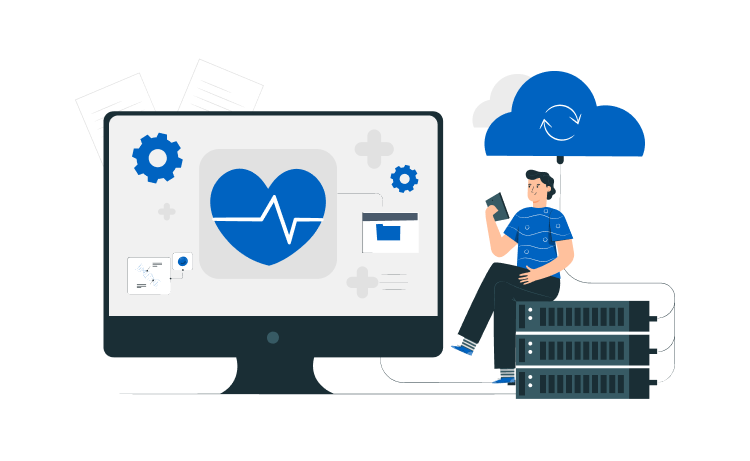Table of Contents
Introduction:
Cloud computing has revolutionized several industries, with healthcare being one of the most impacted. The ability to store, manage, and process vast amounts of data remotely offers healthcare providers, institutions, and patients numerous benefits. From improving patient care to streamlining administrative processes, the integration of cloud technologies is transforming healthcare systems worldwide. Let’s dive into the key applications and importance of cloud computing in healthcare.

What Are the Applications of Cloud in Healthcare?
- Electronic Health Records (EHRs) Management: Cloud computing has made it easier to store and access patient records. With centralized EHR systems hosted in the cloud, healthcare providers can access patient histories, medications, and treatment plans in real time, ensuring quick decision-making and continuity of care.
- Telemedicine: Cloud-based platforms enable telemedicine services, allowing healthcare providers to consult with patients remotely. This is especially useful in rural areas or during emergencies. Video conferencing, remote monitoring, and real-time data exchange are made seamless through cloud services.
- Collaboration and Information Sharing: Cloud computing allows multiple healthcare professionals across different locations to collaborate and share critical patient data. This ensures that specialists from various fields can contribute to a patient’s care plan without geographical limitations.
- Data Storage and Backup: Healthcare institutions generate enormous amounts of data. Cloud computing offers secure, scalable storage solutions, ensuring that medical data is both protected and easily accessible in emergencies or system failures.
- Health Analytics and Research: Cloud computing powers advanced analytics by processing large datasets in real time. Researchers can utilize cloud platforms for faster analysis, leading to innovations in treatment protocols, drug discoveries, and personalized medicine.
What Are the Five Applications of Cloud Computing?
- Data Storage: One of the primary uses of cloud computing in healthcare is the safe and efficient storage of large volumes of medical data. Cloud storage solutions allow institutions to manage patient records, images, and other data securely without investing in expensive on-premise hardware.
- Disaster Recovery and Backup: Cloud computing enables seamless disaster recovery and backups, ensuring that critical healthcare data is protected from breaches, data loss, or unexpected system failures.
- AI and Machine Learning Integration: Cloud platforms support the integration of artificial intelligence (AI) and machine learning (ML), which can process complex datasets to identify patterns in diagnostics, treatment outcomes, and patient behaviors, ultimately leading to enhanced patient care.
- Remote Patient Monitoring: Wearable devices and sensors can transmit patient data to cloud platforms in real-time. Doctors can monitor patient health indicators such as heart rate, glucose levels, or blood pressure remotely and intervene if necessary.
- Collaboration Tools: With cloud-based collaboration platforms, healthcare teams can easily communicate, share documents, and work together in real-time. This can accelerate treatment planning and enhance overall patient outcomes.

What Is the Importance of Cloud Computing in Healthcare?
- Improved Patient Care: Cloud computing facilitates instant access to patient data, ensuring healthcare providers can make faster, more accurate decisions. Telemedicine, powered by cloud technology, expands access to healthcare for patients who may not have easy access to physical healthcare facilities.
- Cost Efficiency: Healthcare organizations no longer need to invest in expensive IT infrastructure for data storage and processing. Cloud solutions offer pay-as-you-go models, allowing hospitals and clinics to scale services according to their needs without major capital investments.
- Enhanced Security: With strict compliance requirements, such as HIPAA, cloud service providers ensure that healthcare data is encrypted and secure. Cloud platforms also implement multi-layered security measures that protect sensitive medical information from breaches and cyberattacks.
- Scalability and Flexibility: Cloud computing solutions offer flexible storage and computing capacity, allowing healthcare institutions to scale up or down based on their needs. This flexibility is particularly crucial during times of unexpected demand, such as during a pandemic or healthcare crisis.
- Real-Time Data Access: The cloud enables real-time data access and analytics, which is crucial for life-saving decisions in critical care situations. Additionally, predictive analytics can assist in preventing illnesses by identifying at-risk patients early on.
Use Case Studies
- Cleveland Clinic – Cloud-Based Telemedicine Services: The Cleveland Clinic implemented a cloud-based telemedicine system to offer virtual visits to patients, significantly expanding access to healthcare during the COVID-19 pandemic. With cloud infrastructure, they were able to handle large numbers of virtual consultations and provide immediate care without overwhelming their physical locations.
- Mayo Clinic – Data Analytics for Patient Care: Mayo Clinic utilizes cloud computing for advanced data analytics, enabling doctors to process and analyze vast amounts of patient data in real time. The integration of AI and cloud technologies has accelerated research, leading to quicker diagnosis and personalized treatment plans.
- Pfizer – Cloud-Driven Research and Development: Pfizer leveraged cloud computing to expedite its drug development and research processes. During the COVID-19 vaccine development, cloud platforms were used for analyzing data sets, running simulations, and sharing findings across global teams, contributing to the rapid deployment of life-saving vaccines.
Conclusion:
The applications and importance of cloud computing in healthcare cannot be overstated. By offering real-time access to patient data, enabling telemedicine, ensuring robust security, and facilitating research and development, cloud technology is transforming healthcare delivery. As healthcare providers continue to adopt cloud solutions, the industry will see even more improvements in patient outcomes, operational efficiency, and innovation.
What is cloud computing in healthcare?
Cloud computing in healthcare refers to the use of cloud-based systems to store, manage, and process healthcare data. It enables healthcare providers to access patient records, collaborate remotely, and utilize advanced tools like AI for diagnostics and treatment, leading to improved patient care and operational efficiency.
What are the challenges of cloud computing in healthcare?
Some challenges of cloud computing in healthcare include data privacy concerns, potential security breaches, compliance with healthcare regulations (such as HIPAA), and the need for reliable internet access. However, modern cloud providers offer encrypted and secure environments to mitigate many of these risks.
How secure is cloud computing in healthcare?
Cloud computing in healthcare is highly secure when managed by reputable cloud service providers who follow stringent security protocols, such as encryption, multi-factor authentication, and compliance with healthcare regulations like HIPAA. These measures ensure patient data is protected from unauthorized access.
What are the future trends for cloud computing in healthcare?
Future trends for cloud computing in healthcare include more widespread adoption of AI-powered diagnostics, increased use of telemedicine, enhanced interoperability between healthcare systems, and further advancements in secure data-sharing capabilities to support global healthcare initiatives.